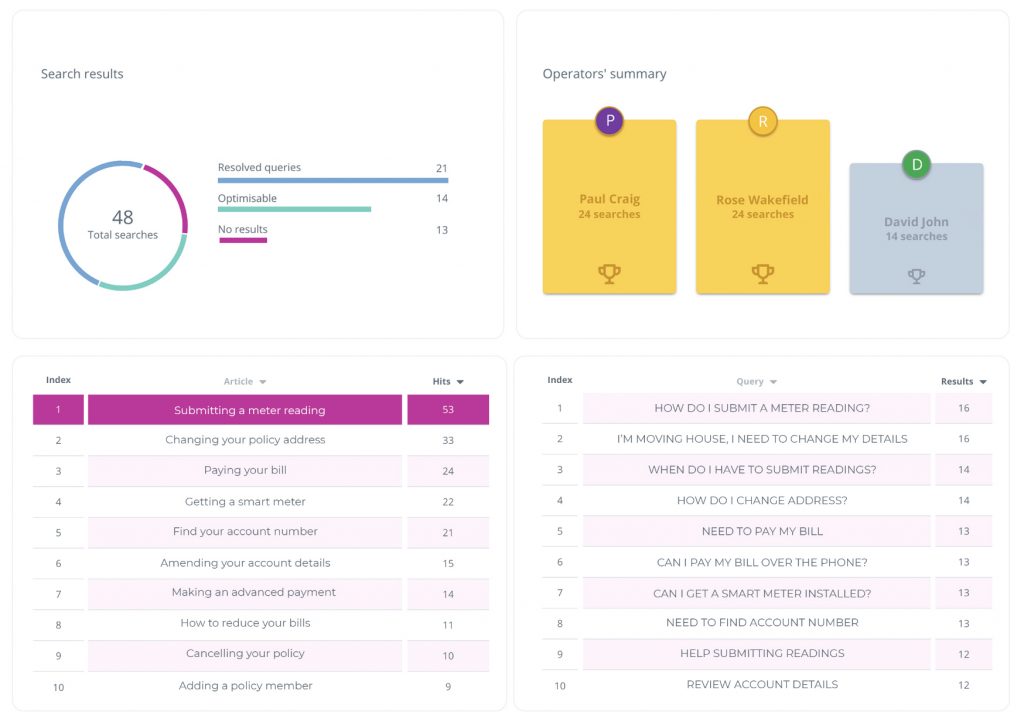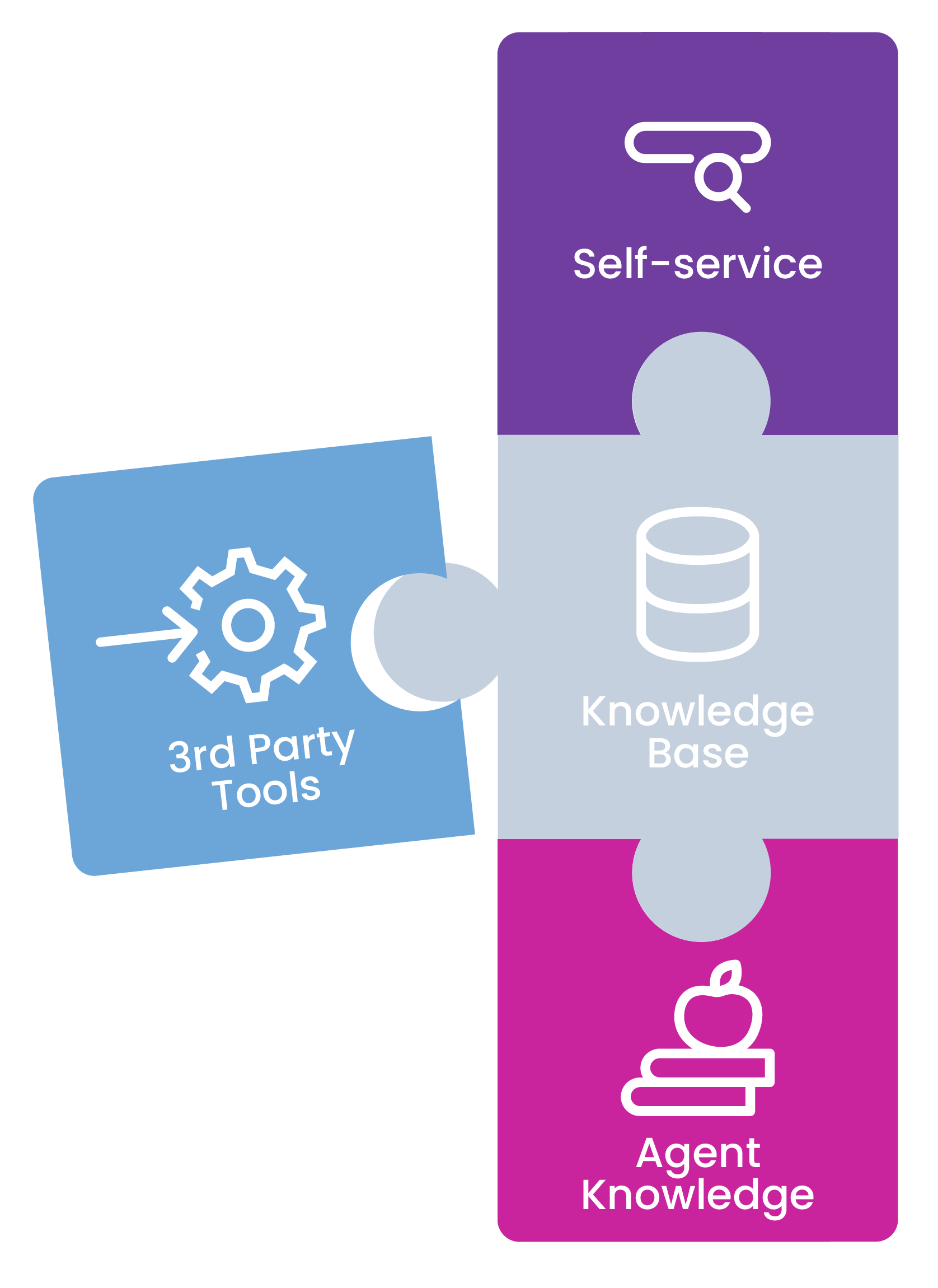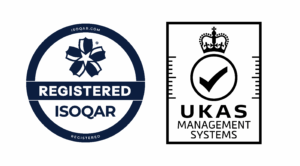What Is Knowledge Management?
Knowledge management is a discipline utilised by businesses to optimise knowledge and the way in which it is treated. It concerns the extraction, collection, analysis, sharing and development of companywide data to promote operational efficiency and enrich both customer and employee experience.
By embedding knowledge management into a company, a knowledge sharing culture is created whereby knowledge is perceived as an asset that has a monetary value attached. Companies who effectively implement knowledge management experience:
- A significant reduction to customer service support costs
- Higher CSAT ratings
- Improved operational efficiency
- Greater accuracy and consistency of information
- Faster, more informed decision making
- Enhanced CX
- Empowered employees
It’s important for businesses to stay on top of knowledge management if they want to remain competitive, satisfy their stakeholders and avoid stagnancy.
For successful implementation, companies must utilise a variety of intelligent knowledge management tools, with the more important being a knowledge base.
The Importance of a Knowledge Base
A knowledge base is ultimately what facilities knowledge management within any organisation. Without this essential knowledge management tool, knowledge sharing both internally and externally would prove ineffective, inaccurate, and cumbersome.
A knowledge base works as your company’s centralised repository of knowledge, containing everything from product specifications to brand guidelines and support tutorials to returns policies. Its purpose is to make the right information accessible to the right people at the right time, this could be employees, agents or customers.
As your sole source of knowledge, the risk of inconsistent or inaccurate information being distributed is significantly reduced. Your knowledge base powers all your key customer service and knowledge management tools, feeding them with accurate and up-to-date information. This contributes positively to CSAT and mitigates the chances of brand reputation being damaged.
A knowledge base helps to improve efficiency companywide. Not only does it integrate seamlessly with all your key business and customer service tools enabling smooth, 2-way knowledge sharing, but it tears down knowledge silos. Knowledge otherwise kept within teams or locations is stored in one place for all to benefit from. Now equipped with more, richer knowledge, decision making at both an operational and strategic level is optimal.
Further, as Sir Francis Bacon said, “knowledge is power” – it is an asset and the more you harness it the more competitive you become.
At the core of any effective knowledge management strategy is a knowledge base, the function cannot be successfully implemented without this powerful tool.
What Are Knowledge Management Tools?
In addition to your knowledge base, other knowledge management tools that involve customer relationships and analytics can help to improve operational efficiency. With the knowledge base at the centre of knowledge management, other 3rd party applications such as CRMs and analytical tools increase cohesion across your entire technology stack.
Intelligent Knowledge Bases
Built on AI and harnessing powerful Natural Language Processing (NLP), an intelligent knowledge base is the nucleus of knowledge management. It stores and shares valuable information using AI, intelligent search systems and filters to ensure the correct knowledge is served to the correct audience.
Its editor system allows knowledge articles to be added, updated, edited and linked to one another with ease, all reflecting in real-time to ensure the consistent distribution of answers. Not only is it easy to maintain, but users can also find what they’re looking for through categories, views and the system’s sophisticated NLP.
Integral to CSAT
An intelligent knowledge base’s NLP helps customers find quick and relevant answers through the customer-facing tools they interact with, positively contributing to CSAT. Self-service and chatbot applications for example that integrate with your knowledge base utilise NLP to understand the context and intent behind customer queries. By unpicking sentence structure and analysing keywords, intent, grammar and popularity, relevant results can be delivered regardless of how a query is phrased. This allows a large proportion of routine queries to be solved simultaneously and at scale using AI, removing the need for an agent and providing a smooth customer journey.
Essential to Agent Efficiency
For the contact centre, an intelligent knowledge base is essential when it comes to agent efficiency. With all information intuitively available at agents’ fingertips, they do not have to toggle between windows and resources to find the right knowledge articles. The result of which means that more customers can be served, reducing Average Handling Times (AHT) by 40%. Additionally, knowledge bases that harness Natural language processing (NLP) are shown to consistently deliver accurate information to the agent, increasing First Contact Resolution (FCR).
Your knowledge base helps to reduce training times, up to 30% in some cases. Less time and fewer costs are spent on onboarding and training as the knowledge required to train new user has already been extracted and stored in the knowledge base. The provision of your knowledge base ensures that starters don’t have to know an answer to a query or process in your contact centre, but only to know how to find that information.
Customer Relationship Management
Your CRM plays an important role in knowledge management, in particular complementing your knowledge base. Whilst a CRM’s purpose surrounds maintaining customer relationships, it acts as a repository of customer information which is valuable in informing knowledge creation.
The vast data that is captured inside you CRM – everything from demographics to buying patterns, pain points and objections – is highly valuable for decision making but would not be stored in your knowledge base, similar to how articles would not be stored in your CRM.
Analytical Tools
Analytical tools, those that capture, collect and present metrics surrounding knowledge management are imperative to continual operational improvement and knowledge optimisation.
Not only can these metrics tell you how effective knowledge management is proving in relation to serving customers, but it also reveals any content gaps or roadblocks in existing knowledge articles. Specially curated graphs and charts provide insight into how many queries were successfully answered and how many were not, revealing areas for improvement.
Top search query analytics help not only give provide insight into customers’ search behaviour but also help to influence decision making in other areas of business such as product development. If there are patterns in what customers are asking for, this may reveal their current motivations and requirements, ultimately giving you a competitive advantage.

Effective knowledge base software will have a comprehensive analytics suite integrated into the product itself, working seamlessly to provide insights.
Integrating Your Knowledge Management Tools
To further optimise the power of your intelligent knowledge base, integrate it with key business and customer service tools. Effective knowledge bases ensure the seamless integration between other customer service tools such as self-service, chatbots and live chat to facilitate 2-way knowledge sharing. They also utilise open RESTful APIs to connect with key 3rd party applications such as your CRM and email management software.
Such knowledge management integrations allow:
- Customers access to relevant knowledge through self-service tools
- Agents to efficiently answer customer queries with knowledge at their fingertips
- Chatbots to guide customers through their journey whilst answering their routine questions
- Agents to see what a customer is typing via live chat, recommending articles on each keypress
- Customer information to be added and updated automatically in your CRM
- Email and automation to be triggered based on customer interactions

If you enjoyed this article and would like to find out more about knowledge management, you can read our guide here. Or, if you would like any help implementing knowledge management tools, please


